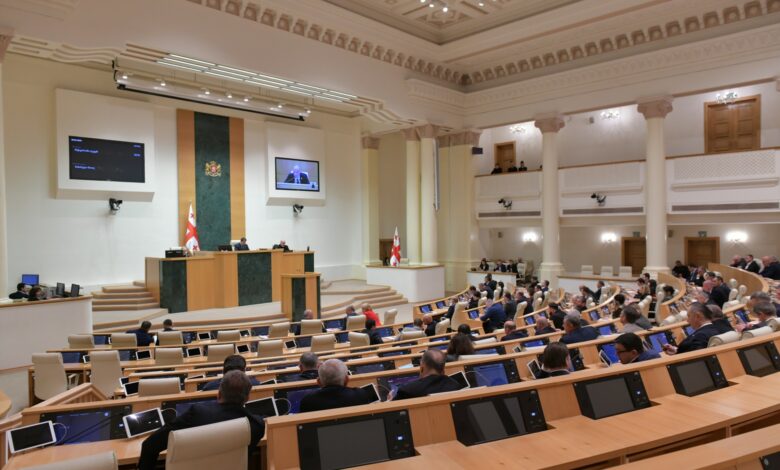
GD Parliament Passes Amendments Paving the Way for Banning Opposition Parties
On May 13, the GD Parliament adopted a legislative package amending the Organic Law on Political Associations of Citizens and the Law on the Constitutional Court, in its final reading. The changes, pushed by the ruling party’s parliamentary majority leader, Mamuka Mdinaradze, are intended to authorize the Constitutional Court to prohibit opposition groups whose leadership, objectives, or activities are identical to those of the previously banned party.
The revised law on Political Associations now allows the Court authorize the Court to ban the political group “whose aim is to overthrow or change Georgia’s constitutional order by force, undermine the country’s independence, violate its territorial integrity, engage in war or violence propaganda, incite national, regional, religious, or social strife.” The amendments to the Law on the Constitutional Court prescribe the Court to issue a decision within no more than nine months of a complaint being filed, or within 14 days during an election period.
In a March 28 statement, announcing the planned legislative changes, Mdinaradze accused opposition parties of acting against the Georgian state, calling them “anti-Georgian, anti-constitutional, anti-national, and criminal.” He argued that parties with “similar” to the UNM leadership, objectives, or activities – what GD refers to as the “collective UNM” – should be barred from participating in political life.
“We are ready for the Georgian people to give a deserved answer to the agents’ network parties in this year’s local elections and to win gloriously,” he further said on April 14. “Then [we will] prepare a very solid and fact-based constitutional case, which in turn should become the basis for the Constitutional Court to ban the collective United National Movement,” Mdinaradze added, arguing that this would happen soon after the local elections, scheduled for October 4.
Critics have condemned the amendments as politically motivated and aimed at stifling dissent ahead of the local elections. The Social Justice Center said that the received changes broaden the grounds for banning political parties, which contradicts the constitution, and argued that introducing vague grounds for banning political parties that disregard the constitution is doubly problematic in conditions where the final decision on banning a party is made by the Constitutional Court, which has long been serving in favor of the regime and “against the spirit of the constitution.”
Also Read:
- 16/04/2025 – GD Rubber Stamps Legislation Forcing Donors to Seek Its Approval for Grant Awards
- 03/02/2025 – GD Announces More Repressive Legislative Changes
- 17/12/2024 – Explainer | Facing Resistance, Georgian Dream Rushes in Repressive Laws
This post is also available in: ქართული Русский